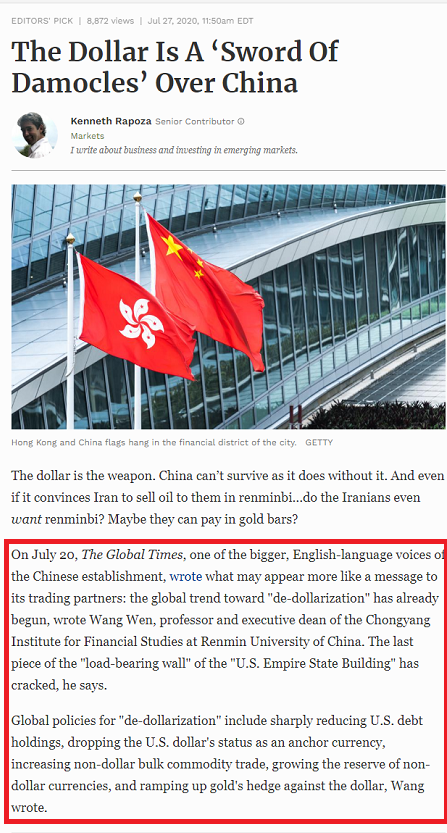Commentaries
Your Present Location: Teacher_Home> Wang Wen> Commentaries【Forbes】The Dollar Is A ‘Sword Of Damocles’ Over China
Source: Forbes Published: 2020-07-27
The dollar is the weapon. China can’t survive as it does without it. And even if it convinces Iran to sell oil to them in renminbi...do the Iranians even want renminbi? Maybe they can pay in gold bars?

On July 20, The Global Times, one of the bigger, English-language voices of the Chinese establishment, wrote what may appear more like a message to its trading partners: the global trend toward "de-dollarization" has already begun, wrote Wang Wen, professor and executive dean of the Chongyang Institute for Financial Studies at Renmin University of China. The last piece of the "load-bearing wall" of the "U.S. Empire State Building" has cracked, he says.
Global policies for "de-dollarization" include sharply reducing U.S. debt holdings, dropping the U.S. dollar's status as an anchor currency, increasing non-dollar bulk commodity trade, growing the reserve of non-dollar currencies, and ramping up gold's hedge against the dollar, Wang wrote.
Here is the problem with that. Based on the SWIFT Renminbi tracker, China’s currency makes up less than 2% of global trade and that number has held steady within about 10 basis points for at least the past three years. There is no boom in demand for pricing iron ore from Australia in RMB, or Brazilian soy, or Chilean copper.
Even Russia, which has been on Washington’s blacklist since 2014, has not drastically reduced dollar holdings in its central bank reserves. Gold is not even close to comparable in its weighting to the dollar at the Russian Central Bank.
China needs the dollar for now, and in a weird way, the U.S. might need China to need it. Blowing up Hong Kong banks would be a mess.
The recently-enacted Hong Kong Autonomy Act gives Trump the ability to enact sanctions against the leading Hong Kong banks.
The State Department has 90 days to designate individuals or banks, which if targeted would have one year to cease business relations with the U.S.
Only a few banks are expected to be targeted, if any, and they would be allowed to appeal. This has eased some worries over an escalating financial war between the two.
Furthermore, while the White House will release the list of sanctioned individuals prior to the November elections, they are under no such time pressure to do the same with banks.
One can imagine if Trump loses in November, perhaps due to public exhaustion over the pandemic and the relentless and unbearable outrage on behalf of his political opponents, that he would have about a month to lash out against China and let new President Biden undertake a reversal.
That would make for an interesting narrative shift, in defense of China’s dollar needs.
China does not want to see Hong Kong banks cut off from dollars, at least not yet. It is unclear if they are prepared for such a thing.
As much as the Global Times may chest pound, such a move would be at the very least a negative sentiment driver for Hong Kong’s financial services industry.
“It’s very much part of China’s interest to keep Hong Kong’s status and flow of dollars,” thinks Julia Hermann, senior global strategy analyst for Cartica Management. “I don’t see any imminent risk of the Hong Kong losing its dollar peg.”
Carie Li Ruofan, an economist at OCBC Wing Hang Bank, told the South China Morning Post last week that Hong Kong banks are definitely on guard, but not panicked.
“Since the president has given a lot of time to identify these banks and to impose the actual sanctions, there isn’t a real market impact and there aren’t excessive concerns for the time being,” she told the Hong Kong daily.
Nowhere in the executive order does it mention limiting Hong Kong banks’ access to the dollar payment system as a way of punishing China.
Such a move would be the “sword of Damocles” for China, but more so for Hong Kong. The currency peg system has allowed the city to remain a global financial hub.
“There is no risk of this financial nuclear bomb being dropped any time soon,” says Brian McCarthy, chief market strategist at Macrolens, a boutique investment research firm out of Stamford, Connecticut.
“That does not mean the Chinese are not rightfully terrified of the possibility of having their financial life lines cut,” he adds.
China is no doubt maneuvering behind the scenes already to create an alternative settlement to SWIFT, and a reserves currency backstop with some countries who are big trade partners with them. Depending on who they ask, it is unlikely they’ll have as much success as they think.
Wang Wen is professor and executive dean of Chongyang Institute for Financial Studies at Renmin University of China, and executive director of China-US People-to-People Exchange Research Center. His latest book is Great Power's Long March Road. wangwen2013@ruc.edu.cn























































































 京公网安备 11010802037854号
京公网安备 11010802037854号





